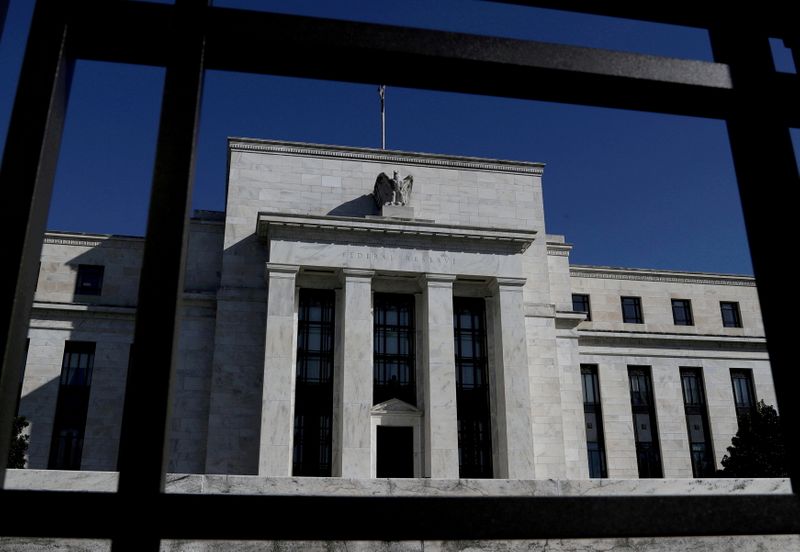By Howard Schneider and Lindsay (NYSE:LNN) Dunsmuir
WASHINGTON (Reuters) - Federal Reserve officials felt their employment benchmark for decreasing support for the economy "could be reached this year," but appeared to disagree on other key aspects of where monetary policy should turn next in the transition from the pandemic crisis, according to minutes from last month's policy meeting.
The account of the July 27-28 meeting showed Fed officials largely expect that later this year they will reduce the central bank's emergency monthly purchases of $120 billion of Treasury bonds and mortgage-backed securities.
But consensus on other key issues appeared elusive, including the start date and pace of the bond-buying "taper," and whether the bigger risk to the recovery is posed by inflation, ongoing joblessness, or the lurking chance that a resurgent coronavirus may throw things into reverse.
As policymakers weighed recent spikes in prices against the value of being "patient" with monetary policy so more hiring could take place, they also noted "the risks that rising COVID-19 cases associated with the spread of the Delta variant could cause delays in returning to work and school, and so damp the economic recovery."
Stocks closed sharply lower in choppy trading, with the S&P 500 index down more than 1%. U.S. Treasury yields fell, with the benchmark 10-year note hovering around 1.26% after rising to a session high of 1.30% before the release of the minutes. The dollar was largely flat.
Debate at the July policy meeting was complicated further by what amounts to the initial discussions of a longer-term decision - when to raise the Fed's overnight benchmark interest rate from the current near-zero level.
While that is a separate decision from exiting the bond program, with its own set of tests to be met, officials have nonetheless begun debating whether inflation had already cleared one of those standards, and begun worrying that their upcoming decision on the taper of asset purchases could be confused with a more rigorous tightening of monetary policy.
Inflation has soared this year, with one closely watched measure running at a 3.5% annual rate in June, well above the Fed's 2% target.
Yet the economy remains 5.7 million jobs short of where it was before the pandemic. With those core goals seemingly in conflict, the Fed is trying to balance the management of two monetary policy tools - bond purchases and interest rates - without either losing control of inflation or curbing the recovery before the economy regains as many jobs as possible.
"A couple of participants cautioned that it could be challenging for the public to disentangle deliberations about the two tools," the minutes stated.
The jobs hole facing Biden https://graphics.reuters.com/USA-ECONOMY/JOBS/ygdpzzqwypw/
The jobs hole facing Biden and the Fed The jobs hole facing Biden and the Fed https://tmsnrt.rs/3vUldhF
BROAD DIVISIONS
Despite the momentum towards their most pressing policy decision of when to taper the asset purchases, the minutes portrayed a level of discord deeper than what came through in the Fed's July 28 policy statement.
That characterized the U.S. recovery as largely on track despite the spread of the Delta variant, with planning for the eventual end of the central bank's bond-buying program underway.
The minutes, however, showed broad divisions among the Fed's 18 top officials, who include the six members of the Washington-based board of governors and the 12 heads of the regional Fed banks.
"Several participants" said aggressive monetary policy was still needed to fix the damage done to the labor market by the pandemic, and felt ongoing bond purchases helped that process.
"A few" countered that Fed policy had little left to contribute to a process driven by private business and household decisions.
"Several" others said the condition of labor markets prior to the pandemic "may not be the right benchmark" given lasting changes to the economy.
The disagreement has continued outside the meeting room.
Prior to the release of the minutes, St. Louis Fed President James Bullard, who wants the taper to begin soon and end fast, said the central bank could "really get into trouble" if it followed a "go-slow" approach to fighting inflation.
Roughly an hour later, San Francisco Fed President Mary Daly said in a post on Twitter that "overreacting" to inflation "can short-circuit our recovery."
Though Bullard and some other Fed regional bank presidents have been vocal in wanting to start the taper soon, it appeared sentiment at the central bank was drifting in the other direction.
"The only thing that is now clearer ... is that the hawkish crowd that has publicly been calling for an ‘early and fast’ tapering does not represent the majority view," Jefferies (NYSE:JEF) economists Thomas Simons and Aneta Markowska said in a note after the release of the minutes.
The minutes also magnified the importance of the next few monthly jobs reports, with solid gains needed to meet the Fed's expectations and show the virus has not begun to again slow the economy.
In December, the central bank said it would not reduce its asset purchases until there had been "substantial further progress" in the jobs recovery.
Substantial progress for the Fed https://graphics.reuters.com/USA-ECONOMY/FEDPROGRESS/qmyvmzzedpr/

"Substantial further progress" for the Fed? https://tmsnrt.rs/3qkjC3B
At that point, the economy was around 10 million jobs shy of where it was before the pandemic. Employers have added 4.3 million jobs since then, including a total of nearly 1.9 million jobs in June and July, a pace some analysts expect to continue into the fall.